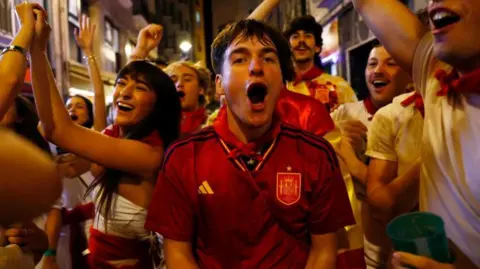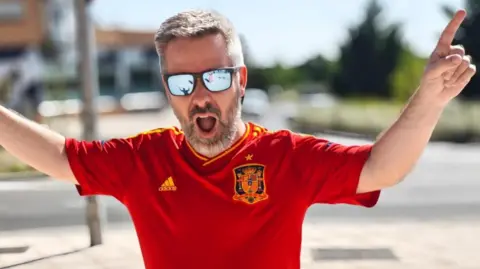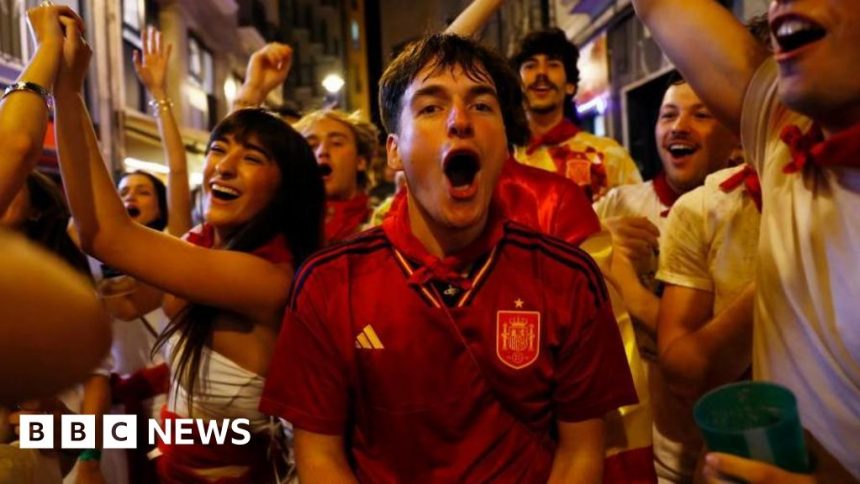High on Yamal fever, Spaniards think Euros victory is theirs
 Reuters
Reuters“This undoubtedly surprises you more than it surprises us,” Spain’s manager Luis de la Fuente told his country’s journalists.
His team had just beaten France in the European Championship semi-finals, setting up a showdown with England in Sunday’s final.
And surprise – of the pleasant kind – is perhaps the best word to describe what many Spanish fans have been feeling throughout this tournament.
Expectation was low on Spain’s sun-kissed streets as the Euros got underway, but that has quickly become national jubilation, helping to bring this much-divided country together.
Quite a difference to the trials and tribulations of Three Lions supporters.

“At first my friends and myself thought that the players selected were a very personal choice of the coach and didn’t represent the opinion of most Spaniards,” said Jorge Gallego, a Spain fan in Madrid.
“We didn’t expect to reach the final but throughout the tournament we started to realise that we could go far.”
While an estimated 11,500 Spanish fans have travelled to Berlin for the final, back home giant screens are being installed in parks, sports centres and squares on which to watch it.
Here in Madrid, local authorities have said that, if Spain wins, victory celebrations will take place around the Plaza de Cibeles in the capital’s centre.
Meanwhile, the players are being lauded, among them defender Marc Cucurella, who has become a folk hero thanks to his big hair and an online song about him which has gone viral.
The lyrics feature paella and beer – it’s a chant often heard in the stands of his league club, Chelsea.
The buoyant atmosphere surrounding the football contrasts with Spain’s rancorous and often toxic politics, where the left-wing government and right-wing opposition seldom agree on anything.
The football team provides a rare rallying point. Parties and politicians have celebrated not just the results but the emergence of players, like Lamine Yamal, who turned 17 on Saturday and has turned out to be the star.
This team also represents Spain’s multi-cultural reality. Yamal’s father is Moroccan and his mother is from Equatorial Guinea, while Nico Williams’s Ghanaian parents reached Spain after travelling across the Sahara Desert and scaling a fence that surrounds the enclave of Melilla.
Yamal has underlined his humble origins, holding his fingers up after scoring to show the postcode 304, the working-class, multi-cultural district of the Catalan town of Mataró where he grew up.
It’s a place that a member of the far-right Vox party, Manuel Gavira, once described as a “multi-cultural dung heap”.
But the overwhelming sensation is that Spaniards are embracing their team, both for its performances and what it represents.
El Periódico newspaper said “a young Spain, sassy and reinvigorated, has become the mirror for a country which has changed and is multi-racial and diverse”.
Even King Felipe joined in the plaudits, saying that the men’s team, radiated “excitement, joy and security”, while praising the “sparkle” of Yamal.
It’s easy to forget that Yamal’s selection raised eyebrows and led to accusations that De la Fuente – a relatively junior coach who had never worked with a top-flight club – did not have the experience to succeed.
On the face of it, the team was a far cry from the star-studded side that conquered two European titles and the World Cup between 2008-2012.
Now, there is a feeling that the national team has returned to the elite, restoring the self-esteem of Spanish fans in the process.
Results are an obvious reason for the renewed belief. It has six wins out of six – a first for any team in the Euros – against opponents that included not just Didier Deschamps’s France, but also hosts Germany and Euro 2020 champions Italy.
The style of those victories has also been crucial. Gone is the close-passing, possession-obsessed “tiki-taka” play which brought Spain so much success in the past. Instead, Spain is playing more directly, with two of its emerging stars, Williams and Yamal, wreaking havoc down the wings.
The result is a less controlled and more thrilling style than in the past.
Spanish fans, who abhor dull football, have bought into it.
“Spain is going to win, without a doubt,” said Luis García, a Venezuelan migrant who supports Spain.
“They’ve shown that they are the best team. It’s amazing that the team has improved so much with this younger generation of players and that our hopes rest on these kids.”







